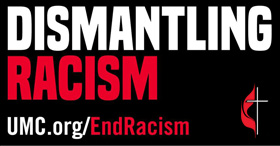Jesus calls his followers to love their neighbor. So why have Christians found ways to refuse their neighbors not just love but basic dignity?
“We know better,” said the Rev. Mai-Anh Le Tran of United Methodist Garrett-Evangelical Theological Seminary in Evanston, Illinois. “Why don’t we act or live differently? It strikes me as that we are still befuddled by our human fallibility.”
For an hour, she and two other theologians wrestled with why racism remains prevalent in the U.S., where Christianity is the dominant faith. They spoke as part of The United Methodist Church’s fourth online panel held to discuss eradicating racial injustice.
The Sept. 16 panel discussion came a day after Barna released new research showing an increasing percentage of practicing Christians who say they are “unmotivated” or “not at all motivated” to address racial injustice.
Barna found that percentage grew from 17% in 2019 to 30% this year, even after the deaths of George Floyd, Ahmaud Arbery and Breonna Taylor and the shooting of Jacob Blake drew international attention, and news spread that COVID-19 is disproportionately killing ethnic minorities, including children.
Find resources

• Voter suppression
• Intersectionality in Anti-Racism
• Colonialism and the Doctrine of Discovery
• Systemic Racism in The United Methodist Church
The same survey found that nearly one in five practicing Christians say that race is “not at all” a problem in the U.S.
Erin Hawkins, the panel’s moderator, pointed to research by PRRI (Public Religion Research Institute) that specifically focused on white Christians in the U.S.
“White Christians are consistently more likely than whites who are religiously unaffiliated to deny the existence of structural racism,” wrote Robert P. Jones, PRRI’s founder, for NBC News.
Such data didn’t surprise the theologians on the panel.
“There is an assumption that somehow racism as systems of behavior, beliefs, values, actions, practices or policies are done by so-called bad people… that we are somehow immune to that,” said Tran, author of “Reset the Heart: Unlearning Violence, Relearning Hope” (Abingdon Press, 2017).
However, she said, that fails to take into account how race still organizes American thinking whether people realize it or not.
“Racism as a system is not something we are purposefully doing against somebody,” said the ordained elder and professor. “It’s our assumption that this is how the world is.”
The Rev. Edgardo Colón-Emeric, who serves on The United Methodist Church’s Faith and Order Committee, said the disconnect “is an example of how the power of sin continues to be at work.”
But he added that it is the legacy of the church’s history and the fact that many Americans don’t know the basics of their own history.
Colón-Emeric pointed to the background he chose for the video conference — a picture of the island of Vieques, which is part of the U.S. today because of conquest during the Spanish-American War of 1898.
“Nobody migrated anywhere. It was conquered as part of war,” said Colón-Emeric, whose mother hails from the Puerto Rican island. “I’m glad the Methodist Church is on the island, but there is also the history of how it came to be on the island.”
For many, it’s hard to separate the act of spreading the Gospel from the act of conquering a people.
However, the theologians urged listeners to look differently at the Christian commission, which is also The United Methodist Church’s mission statement “to make disciples of Jesus Christ.”
The Rev. Willie James Jennings, professor at Yale Divinity School and ordained Baptist minister, acknowledged that many white people feel like they are under attack in this moment when there is so much discussion of racism and colonialism.
However, he added that the effort to dismantle racism is not about diminishing white people so much as reminding them that they aren’t the center of the universe.
“So many people, especially Christians, have formed a world in which everything revolves around them,” said Jennings, who recently published “After Whiteness: An Education in Belonging.”
“So many Christians struggle mightily with this moment, struggle mightily with thinking about racial problems in the world and thinking seriously about the diversity that is God’s creation. The reason is they have to wrestle with a reality in which they aren’t at the center.”
He said Christians have also gotten into the habit into reading the Bible as if it’s first, their book and their story.
The theologians suggested one way to address racism is for Christians to look at Scripture with fresh eyes, reach out to others and look beyond the anxieties of these times.
“You are inside God’s story, and it’s important to center yourself in that story,” Jennings said. “You calibrate what you are doing by that story and no other.”
Like what you're reading? Support the ministry of UM News! Your support ensures the latest denominational news, dynamic stories and informative articles will continue to connect our global community. Make a tax-deductible donation at ResourceUMC.org/GiveUMCom.




